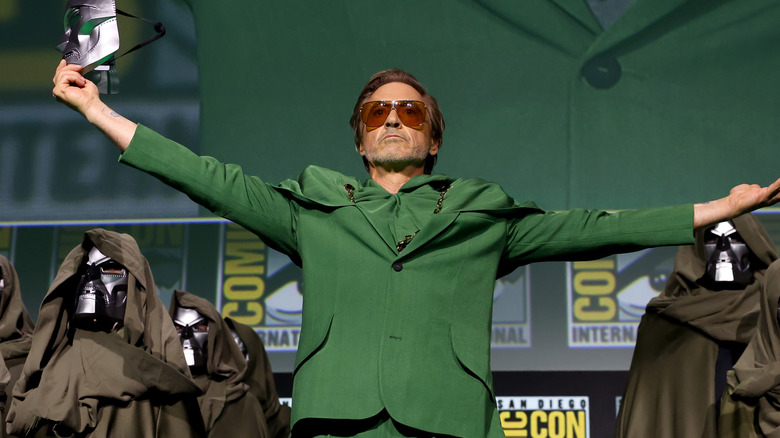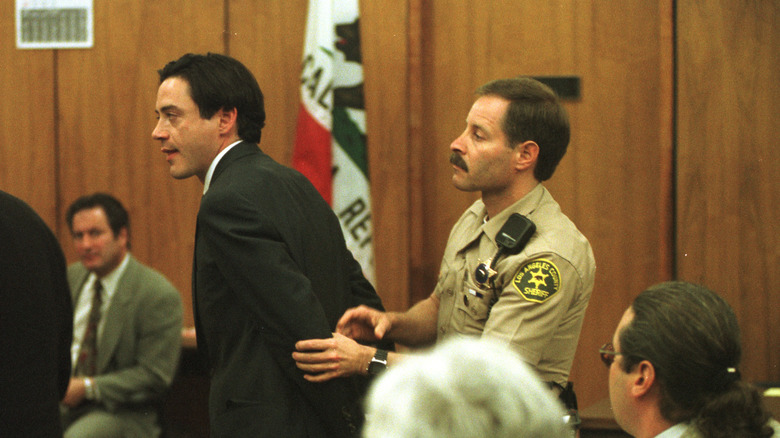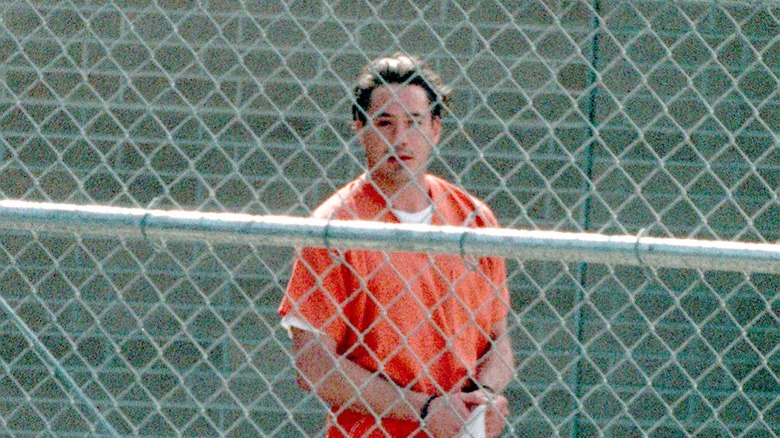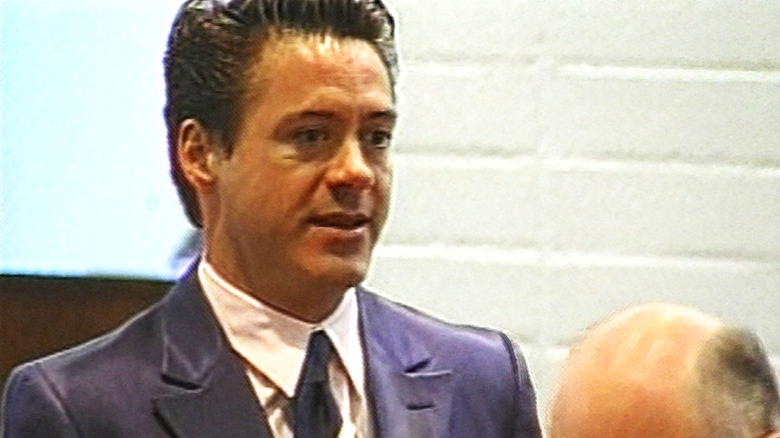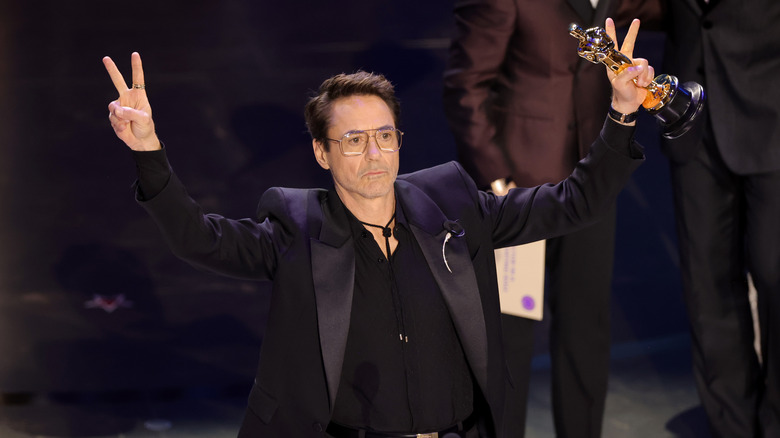The Real-Life Legal Issues Of Robert Downey Jr. Explained
Robert Downey Jr. is one of the most celebrated Hollywood stars working today, though the actor's first Oscar win didn't come until 2024 for his role in "Oppenheimer." Though he's always proven himself as a versatile thespian who can take on a diverse array of parts, he's mostly beloved for his stint as Iron Man in the Marvel Cinematic Universe. Today, Downey Jr. has legions of fans and a healthy bank balance thanks to the MCU, but at one point, the actor was pretty much uncastable, largely due to his various and complex legal issues. In order to help explain the Oscar winner's various brushes with the law, Looper spoke with Camron Dowlatshahi, an entertainment attorney and partner at the Los Angeles-based law firm Mills Sadat Dowlat LLP.
Downey Jr. saw considerable success in the early days of his career, receiving his first Oscar nomination for starring as silver screen icon Charlie Chaplin in 1992's "Chaplin." In 1996, however, the actor began to have issues with the law, which caused his marketability to plummet. That year, the "Tropic Thunder" star was pulled over for speeding on the Pacific Coast Highway. Police reported that the actor was in possession of cocaine, heroin, and an unloaded firearm. As a result, Downey Jr. was sentenced to 100 hours of community service and probation.
Legal expert Dowlatshahi suggests that Downey Jr.'s sentence is in line with how the state typically handles such cases. "In California, a person stopped by police for simple drug possession is typically looking at a misdemeanor conviction as the worst possible outcome, rather than jail time," he said, adding that California typically treats public intoxication as a misdemeanor as well.
Robert Downey Jr.'s legal woes post-1996 explained
1996 was just the start of Robert Downey Jr.'s legal troubles. Following his initial incident, the "Iron Man" superstar was found to be under the influence again when he trespassed into a neighbor's home later that same year. Shortly thereafter, Downey Jr. was ordered to undergo live-in rehab and three years of probation. He also had to go through mandatory drug testing. Unfortunately, Downey Jr. missed a court-appointed drug test in 1997 and was sentenced to six months in a Los Angeles jail. In 1999, Downey Jr. would find himself sentenced again for breaking his parole.
The actor has admitted in court that he abused substances and was an addict. Legal expert Camron Dowlatshahi suggests that things have changed in California, alluding to Downey Jr.'s high-profile brush with the law in 2000. "Celebrities are not likely to be arrested these days in California for simple drug possession," Dowlatshahi tells us. "In California, it's just not a priority for law enforcement like it was back in 2000 when police barged into Robert Downey Jr.'s hotel room in Palm Springs to arrest him for drug possession."
By the turn of the millennium, Downey Jr. had landed a decent gig on "Ally McBeal," but was found with cocaine and valium in his hotel room. What happened with the actor then is unlikely to happen today, according to Dowlatshahi. "Celebrities in California usually get tripped up for drugs or alcohol if they are arrested for driving under the influence," he said. In the wake of his arrest and return to rehab, Downey Jr. was written off "Ally McBeal," stalling what should have been a major comeback.
Did RDJ get into less legal trouble because he's a celebrity?
Many might assume that celebrities get lighter sentencing than regular civilians, and they're typically right. But Camron Dowlatshahi says that there's a logical reason for that: it all boils down to resources. "In general, what sets celebrities apart from the average person in California is they usually have the financial resources to pay for drug treatment if they have an addiction," the entertainment lawyer explained. Throughout the years, Downey Jr. has found himself in and out of rehab programs, showing a commitment to sobriety. "Judges in California are already predisposed to prefer treatment instead of jail time for anyone who has a drug problem," Dowlatshahi added.
While the actor has remained sober for a number of years, getting there was largely difficult, especially from a legal perspective. In the case of Robert Downey Jr., his fame and clout didn't afford him a simple slap on the wrist. The actor was sentenced multiple times and had no choice but to undergo treatment at several rehabilitation facilities. But times have changed, and Dowlatshahi notes that California — and its A-list residents — have switched up how to deal with drug use and possession. "Nowadays, celebrities in California are most likely to do drugs behind closed doors, and so they're far less likely to receive attention from police than people doing drugs on the streets," the lawyer told us.
Furthermore, Dowlatshahi says that police are "discouraged from busting people for drug possession because California voters in 2014 passed Proposition 47 which made drug possession a misdemeanor, instead of a felony with the possibility of serious time behind bars."
How did Robert Downey Jr.'s time in rehab affect his legal situation?
Over the years, Robert Downey Jr. was in and out of rehab, the majority of which was court ordered. Since 2003, the actor has remained sober and emerged as one of the biggest stars in the world. He has continued to inspire many, including "Yellowstone" star Wes Bentley, who sought out his own sobriety thanks to Downey's inspiration. Legal expert Camron Dowlatshahi opened up about how Downey Jr. put in considerable efforts to become sober, which likely could have led to reduced jail time. It's also important to note that the "Chaplin" actor didn't receive any special treatment.
"When Robert Downey Jr. was arrested multiple times and charged with drug possession in the 1990s and the early 2000s, he had the threat of prison time hanging over his head," Dowlatshahi said. "He was in and out of drug treatment programs and he had to be tested for drugs." As we know, treatment failed, and he wound up in jail. Dowlatshahi described Downey's time in a Los Angeles County jail in 1997 as "no picnic," saying that the judge "came down hard on him" for not staying sober. "Then, in 1999, he dodged a drug test, and a judge sentenced him to three years in prison for it. He ended up serving 15 months of that sentence, which is serious time," the lawyer said, further stating that Downey "paid the price."
But did his time in rehab directly affect his legal situation? Dowlatshahi thinks so. "Yes, he could have received more time behind bars if he had never gone to rehab. But he did not get off lightly or get treated with kid gloves just because he was a celebrity."
The impact of Robert Downey Jr.'s legal troubles explained
Today, Robert Downey Jr. has reinvented himself, proving that everybody deserves a second chance. The actor is now set to make his return to the MCU with the upcoming film "Avengers: Doomsday," which features him in the titular role of Doctor Doom. But despite just how far Downey Jr. has come, the actor is, perhaps unfortunately, still known for his addictions and legal woes. However, Camron Dowlatshahi suggests that the star's high-profile cases may have had a positiver impact on California's legal policies. "Downey's troubles with the law might have actually helped raise public awareness that addiction is a medical issue and that avoiding drug use is not as simple as the 1980s slogan 'Just say no,'" the lawyer said.
Since the '90s and early 2000s, California's policies have radically changed and are now less punitive. As explained by the legal guru, "In California, at the height of Downey's drug problems, voters in California passed Proposition 36 which diverted many non-violent drug offenders to treatment programs instead of jail." Dowlatshahi says that the state has gone a lot further in terms of being progressive, citing that, in 2014, voters passed Proposition 47, which made drug possession a misdemeanor. "If these laws were in place in the 1990s, Downey would not have been looking at the same kinds of stiff penalties that he had to worry about then."
If you or anyone you know needs help with addiction issues, help is available. Visit the Substance Abuse and Mental Health Services Administration website or contact SAMHSA's National Helpline at 1-800-662-HELP (4357).
